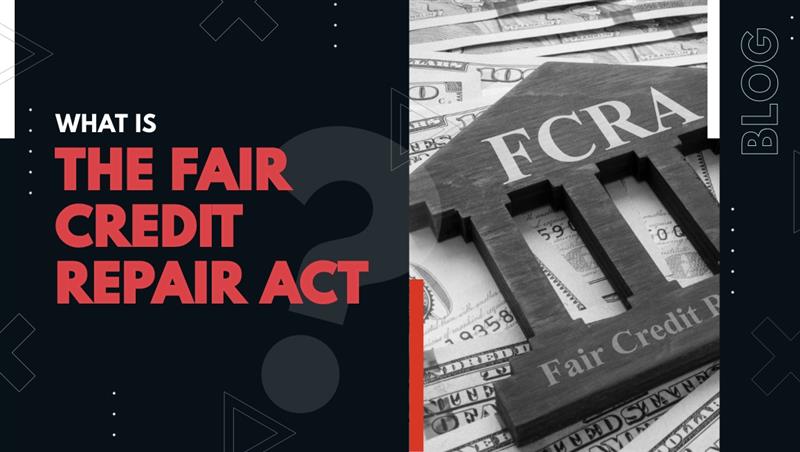What Is the Fair Credit Reporting Act (FCRA)?
by Almas Tariq
May 19, 2025
04:54 PM

In the credit repair industry, trust and compliance are everything. Whether you’re helping a client dispute inaccuracies or educating them about their rights, having a clear grasp of the Fair Credit Reporting Act (FCRA) is non-negotiable.
The FCRA, enacted in 1970 and most notably amended by the Fair and Accurate Credit Transactions Act (FACTA) in 2003, is the foundational law governing how credit information is collected, used, and corrected in the United States. As a credit repair professional, this law sets the parameters for how you operate—and how you protect your clients.
In this guide, we’ll break down the FCRA’s most relevant provisions so you can serve your clients better, reduce risk, and grow your business on a solid legal foundation.
🔍 Why the FCRA Matters for Credit Repair Professionals
The FCRA exists to ensure that:
- Consumers are treated fairly in credit-related decisions
- Credit reports are accurate and up to date
- Individuals can access and dispute information in their credit files
For your credit repair business, the FCRA provides the legal structure within which all disputes must occur. Misunderstanding or ignoring these rules can expose your business to regulatory action, consumer complaints, or lawsuits.
Understanding the FCRA allows you to:
- Provide accurate education to clients
- Guide dispute processes lawfully
- Avoid deceptive marketing or service practices
- Distinguish your brand as trustworthy and compliant
🧾 What the FCRA Requires—and How It Applies to You
✅ 1. The Right to Access Credit Reports
Consumers are entitled to receive a free copy of their credit report from each of the three major credit bureaus—Equifax, Experian, and TransUnion—once every 12 months via AnnualCreditReport.com. As a service provider, you can assist clients in accessing these reports—but only with proper written authorization and documentation.
✅ 2. The Right to Dispute Inaccurate or Incomplete Information
Your role is to help clients legally challenge:
- Outdated negative accounts
- Incorrect personal information
- Accounts that don’t belong to them
- Errors in payment history or balances
Under the FCRA:
- Disputes must be submitted to the credit bureau and/or data furnisher (e.g., creditor or collector)
- The bureau has 30 days to investigate the dispute
- If the information is inaccurate or unverified, it must be corrected or deleted
- The consumer must be notified of the results
⚠️ Important: Never promise specific deletions or guaranteed score increases. The FCRA ensures the right to dispute—but not guaranteed outcomes.
⚖️ 3. Consumer Notification Rights
If a client is denied credit, employment, housing, or insurance based on information in a credit report, the FCRA requires that the company making that decision provide:
- A written adverse action notice
- The name and contact info of the credit bureau used
- A statement informing the client of their right to obtain a free report within 60 days
As a credit repair provider, you should educate clients about this process and support them in reviewing the report that led to the denial.
🕵️♀️ 4. Privacy and Access Rules
Under the FCRA:
- Only those with a permissible purpose can access someone’s credit report
- Unauthorized pulling of reports is illegal and can result in civil penalties
- As a credit repair company, you must obtain signed authorization before accessing any credit information
Protect your business by keeping detailed records of all signed consents, dispute letters, and client communications.
🛡️ 5. Removals and Retention Timelines
The FCRA sets the retention period for negative information on credit reports:
- Late payments: 7 years
- Collections: 7 years from the date of first delinquency
- Chapter 13 bankruptcy: 7 years
- Chapter 7 bankruptcy: 10 years
- Unpaid tax liens or civil judgments: May remain longer (though most are no longer included under newer bureau policies)
It’s important to set realistic expectations with clients about what can be removed and when.
💡 6. Violations and Enforcement
If a credit bureau or data furnisher violates a consumer’s rights under the FCRA—such as failing to investigate a dispute, continuing to report unverifiable information, or denying report access—the consumer has the right to:
- File a complaint with the Consumer Financial Protection Bureau (CFPB)
- Seek legal action for damages
As a business owner, being aware of these consequences helps you avoid practices that might expose you to client complaints or investigations.
🚀 How Credit Repair Businesses Can Leverage the FCRA (The Right Way)
Here are ways to ethically and effectively align your business with the FCRA:
✔ Educate Clients
Use blog posts, social media content, and client onboarding to teach consumers:
- What’s in a credit report
- How to check for errors
- How the dispute process works
✔ Use Compliant Software and Processes
Ensure your CRM, client intake forms, and dispute tracking systems are designed to meet legal requirements. Keep timestamped records and never submit disputes without authorization.
✔ Avoid Red-Flag Marketing Language
Do not use:
- “Fix your credit fast”
- “Remove all negative items guaranteed”
- “Boost your score overnight”
Instead, use:
- “Understand your credit report”
- “Dispute inaccurate or outdated information”
- “Exercise your rights under the FCRA”
✅ Final Thoughts: Compliance Builds Credibility
For credit repair professionals, knowledge of the FCRA is more than just a legal safeguard—it’s a competitive edge. Clients want someone they can trust. Regulators want businesses that follow the rules. And your growth depends on both.
By grounding your services in consumer rights, transparent education, and legal best practices, you not only build a better business—you help create real, lasting financial empowerment for your clients.
❓ Frequently Asked Questions (FAQs)
-
Why is the FCRA important for credit repair businesses?
The FCRA outlines the legal framework for disputing credit report errors. Understanding it helps credit repair professionals guide clients correctly, stay compliant, and avoid legal risks.
-
Can I guarantee deletions or score increases under the FCRA?
No. The FCRA gives consumers the right to dispute inaccurate or unverifiable information, but it does not guarantee specific results. Promising outcomes may violate the Credit Repair Organizations Act (CROA).
-
How long do negative items stay on a credit report under the FCRA?
Most negative items, such as late payments and collections, remain for 7 years. Bankruptcies can remain for up to 10 years. The FCRA governs these timelines and mandates when data must be removed.
Table of Contents
Explore More Insights
Dive deeper into a wealth of knowledge. Discover a multitude of articles covering diverse topics, expert perspectives, and the latest trends. Feed your curiosity and expand your understanding.



